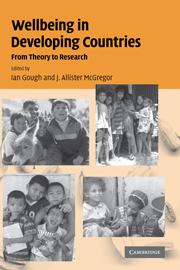Book contents
- Frontmatter
- Contents
- Figures
- Tables
- Notes on contributors
- Acronyms
- Preface
- Introduction
- 1 Theorising wellbeing in international development
- Part I Human needs and human wellbeing
- Part II Resources, agency and meaning
- 7 Wellbeing, livelihoods and resources in social practice
- 8 Livelihoods and resource accessing in the Andes: desencuentros in theory and practice
- 9 Poverty and exclusion, resources and relationships: theorising the links between economic and social development
- Part III Quality of life and subjective wellbeing
- Conclusion: researching wellbeing
- References
- Index
7 - Wellbeing, livelihoods and resources in social practice
Published online by Cambridge University Press: 22 September 2009
- Frontmatter
- Contents
- Figures
- Tables
- Notes on contributors
- Acronyms
- Preface
- Introduction
- 1 Theorising wellbeing in international development
- Part I Human needs and human wellbeing
- Part II Resources, agency and meaning
- 7 Wellbeing, livelihoods and resources in social practice
- 8 Livelihoods and resource accessing in the Andes: desencuentros in theory and practice
- 9 Poverty and exclusion, resources and relationships: theorising the links between economic and social development
- Part III Quality of life and subjective wellbeing
- Conclusion: researching wellbeing
- References
- Index
Summary
Introduction
When in 1334 the Duchess of Tyrol, Margareta Maultasch, encircled the castle of Hochosterwitz in the province of Carinthia, she knew only too well that the fortress, situated on an incredibly steep rock rising high above the valley floor, was impregnable to direct attack and would yield only to a long siege. In due course, the situation of the defenders became critical: they were down to their last ox and had only two bags of barley corn left. Margareta's situation was becoming equally pressing, albeit for different reasons: her troops were beginning to be unruly, there seemed to be no end to the siege in sight, and she had similarly urgent military business elsewhere. At this point the commandant of the castle decided on a desperate course of action which to his men must have seemed sheer folly: he had the last ox slaughtered, had its abdominal cavity filled with the remaining barley, and ordered the carcass thrown down the steep cliff onto a meadow in front of the enemy camp. Upon receiving this scornful message from above, the discouraged duchess abandoned the siege and moved on.
(Watzlawick, Weakland and Fisch 1974: xi)This story gives an example of comic reversal in the definition and deployment of resources.
- Type
- Chapter
- Information
- Wellbeing in Developing CountriesFrom Theory to Research, pp. 157 - 175Publisher: Cambridge University PressPrint publication year: 2007
- 25
- Cited by



